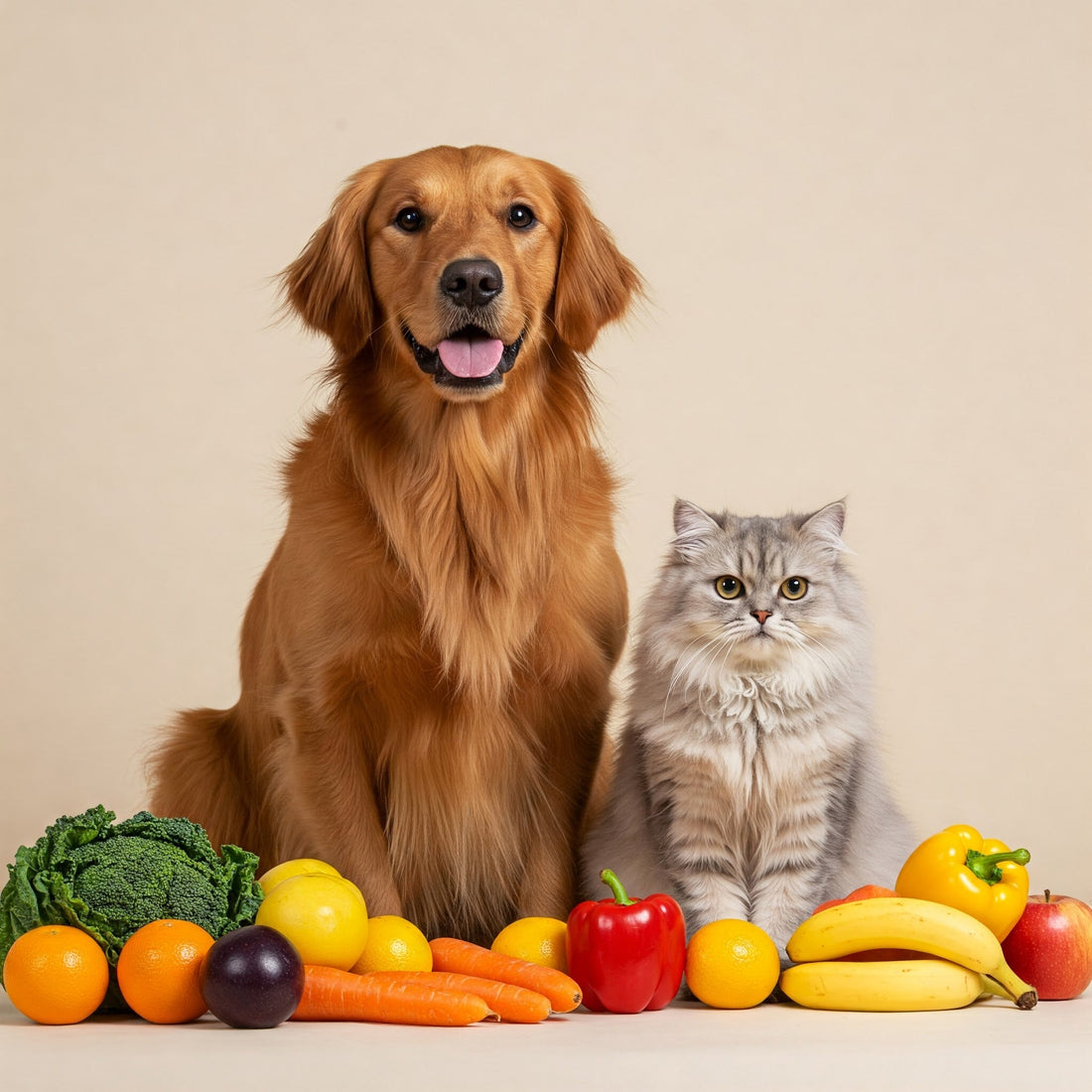
Natural Health and Vitality! Fruits and Vegetables That Boost the Well-Being of Dogs and Cats
Share
As responsible pet owners, we always seek the best for our furry companions. A balanced diet is essential, and although the foundation of their diet is usually quality pet food, incorporating certain fruits and vegetables can provide extra vitamins, minerals, and fiber, contributing to their overall health and well-being. In this article, we'll explore which fruits and vegetables are safe and beneficial for dogs and cats, how to offer them, and which ones to avoid. Get ready to discover a world of flavor and natural health for your pets!
Why Include Fruits and Vegetables in Your Pet's Diet?
Although dogs and cats have different nutritional needs, some fruits and vegetables can be a healthy addition to their diet, providing:
- Essential Vitamins: Such as vitamins A, C, K and B vitamins, which are important for various body functions.
- Minerals: Such as potassium, magnesium and calcium, crucial for bone, muscle and nerve health.
- Fiber: Aids digestion, prevents constipation, and can contribute to a feeling of fullness.
- Antioxidants: Protect cells from damage caused by free radicals, strengthening the immune system.
- Hydration: Some fruits and vegetables have a high water content, which can help keep your pet hydrated, especially during the warmer months.
Safe and Beneficial Fruits for Dogs:
- Apples (seedless): Rich in fiber and vitamins A and C. They aid digestion and can contribute to dental health.
- Bananas: Good source of potassium, magnesium, and vitamin B6. They can help with mild digestive problems.
- Blueberries: Loaded with antioxidants, which can help brain function and protect against cell damage.
- Strawberries: Rich in vitamin C and antioxidants, they can be a refreshing and healthy snack.
- Melon and Watermelon (without peel or seeds): High in water and vitamins A and C. Ideal for hydration in summer.
- Pears (seedless): Good source of fiber and vitamins C and K.
Safe and Beneficial Vegetables for Dogs:
- Carrots: Low in calories and rich in beta-carotene (a precursor to vitamin A), they're good for your eyesight and skin. Chewing them can also help improve dental health.
- Broccoli and Cauliflower (in moderation): Contain vitamins C and K, and fiber. Large amounts can cause gas.
- Pumpkin (puree, unspiced): Excellent source of fiber, which can help with both constipation and mild diarrhea.
- Sweet potatoes (cooked, without skin): Rich in fiber, vitamin B6 and vitamin C. They are a healthy source of energy.
- Peas (without pods): Good source of fiber, vitamins and minerals.
- Green Beans (cooked, without strings): Low in calories and rich in vitamins and fiber.
Safe and Beneficial Fruits and Vegetables for Cats (in moderation):
Cats are strict carnivores, and their fruit and vegetable needs are lower than those of dogs. However, some can offer benefits in small amounts:
- Melon (without peel or seeds): It can be a hydrating snack.
- Blueberries: They can provide antioxidants.
- Pumpkin (puree, unspiced): As with dogs, it can help with mild digestive problems.
- Carrots (cooked): May offer some vitamins, although they are not a necessity.
- Peas (cooked): They can be an occasional snack.
- Cucumber (without skin or seeds): High in water, can be refreshing.
Caution! Toxic or Dangerous Fruits and Vegetables:
It is crucial to know which fruits and vegetables are harmful to your pets:
- Grapes and Raisins: Can cause acute kidney failure in dogs. Avoid them at all costs!
- Onion and Garlic (in all forms): Contain compounds that can damage red blood cells and cause anemia in dogs and cats.
- Avocado: Contains persin, a substance generally safe for humans but toxic to many pets, especially in large quantities.
- Chocolate: Contains theobromine, a stimulant toxic to dogs and cats.
- Macadamia Nuts: May cause weakness, tremors, and vomiting in dogs.
- Fruit Pits (apple, peach, etc.) and Seeds: May contain cyanide and cause blockages.
- Green tomatoes and tomato leaves: They contain solanine, which can be toxic. Ripe tomatoes in small amounts are generally safe for dogs.
How to Offer Fruits and Vegetables to Your Pet:
- Introduce gradually: To avoid digestive problems, offer small amounts at first.
- Wash well: Make sure to remove any pesticide residue or dirt.
- Cut into small pieces: To prevent the risk of choking.
- Seedless and pitted: Always remove seeds and pits.
- Cooked (in some cases): Some vegetables are easier to digest cooked (steamed or boiled without salt or seasoning).
- As a reward or supplement: They should not be the basis of your diet, but rather an occasional extra.
- Observe reactions: Pay attention to any signs of digestive discomfort or allergies.
Conclusion:
Incorporating certain fruits and vegetables into your dog or cat's diet can be a great way to provide additional nutrients and promote their health and well-being. However, it's essential to learn which ones are safe and how to offer them correctly. Always remember to consult your veterinarian before making significant changes to your pet's diet!
What fruits or vegetables does your pet love? Share them in the comments!
Do you have any questions about feeding your dog or cat? Leave us your question!
